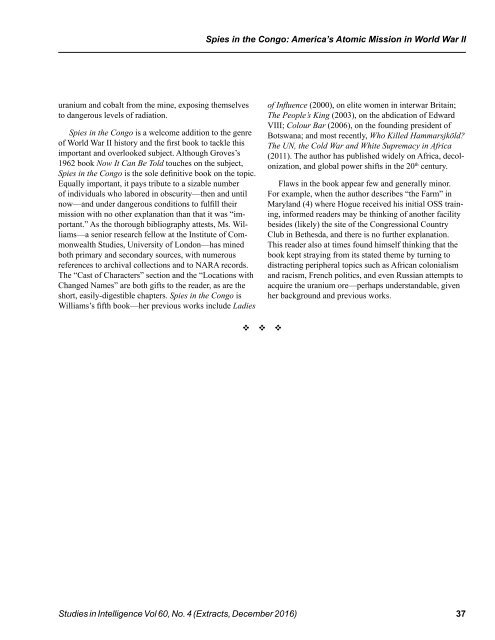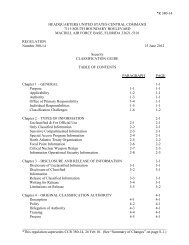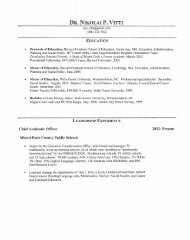extracts-studies-dec-2016
extracts-studies-dec-2016
extracts-studies-dec-2016
Create successful ePaper yourself
Turn your PDF publications into a flip-book with our unique Google optimized e-Paper software.
Spies in the Congo: America’s Atomic Mission in World War II <br />
<br />
uranium and cobalt from the mine, exposing themselves<br />
to dangerous levels of radiation.<br />
Spies in the Congo is a welcome addition to the genre<br />
of World War II history and the first book to tackle this<br />
important and overlooked subject. Although Groves’s<br />
1962 book Now It Can Be Told touches on the subject,<br />
Spies in the Congo is the sole definitive book on the topic.<br />
Equally important, it pays tribute to a sizable number<br />
of individuals who labored in obscurity—then and until<br />
now—and under dangerous conditions to fulfill their<br />
mission with no other explanation than that it was “important.”<br />
As the thorough bibliography attests, Ms. Williams—a<br />
senior research fellow at the Institute of Commonwealth<br />
Studies, University of London—has mined<br />
both primary and secondary sources, with numerous<br />
references to archival collections and to NARA records.<br />
The “Cast of Characters” section and the “Locations with<br />
Changed Names” are both gifts to the reader, as are the<br />
short, easily-digestible chapters. Spies in the Congo is<br />
Williams’s fifth book—her previous works include Ladies<br />
of Influence (2000), on elite women in interwar Britain;<br />
The People’s King (2003), on the abdication of Edward<br />
VIII; Colour Bar (2006), on the founding president of<br />
Botswana; and most recently, Who Killed Hammarsjköld?<br />
The UN, the Cold War and White Supremacy in Africa<br />
(2011). The author has published widely on Africa, <strong>dec</strong>olonization,<br />
and global power shifts in the 20 th century.<br />
Flaws in the book appear few and generally minor.<br />
For example, when the author describes “the Farm” in<br />
Maryland (4) where Hogue received his initial OSS training,<br />
informed readers may be thinking of another facility<br />
besides (likely) the site of the Congressional Country<br />
Club in Bethesda, and there is no further explanation.<br />
This reader also at times found himself thinking that the<br />
book kept straying from its stated theme by turning to<br />
distracting peripheral topics such as African colonialism<br />
and racism, French politics, and even Russian attempts to<br />
acquire the uranium ore—perhaps understandable, given<br />
her background and previous works.<br />
v v v<br />
Studies in Intelligence Vol 60, No. 4 (Extracts, December <strong>2016</strong>)<br />
37




